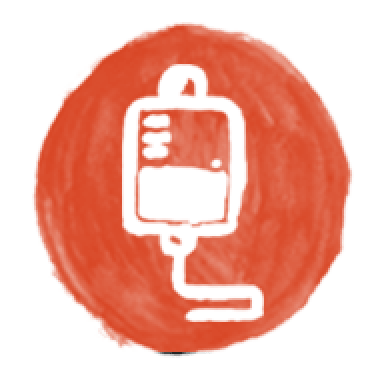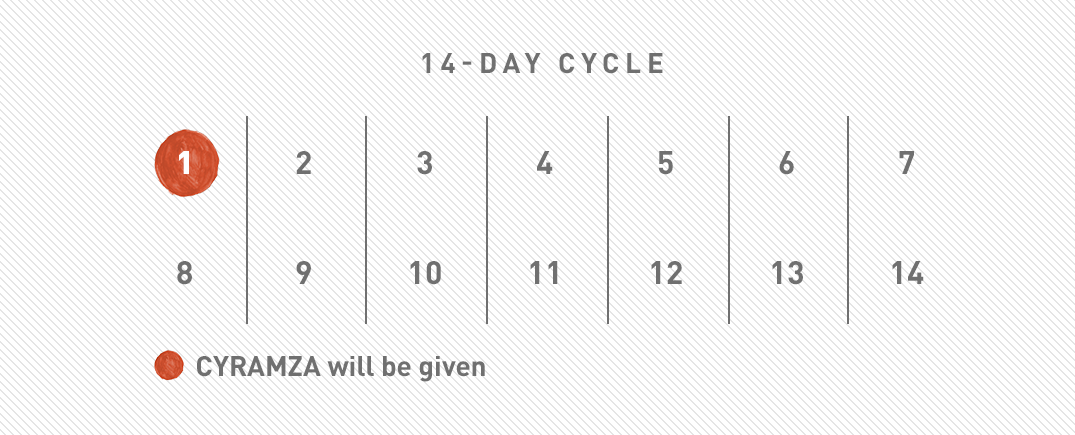When living with AFP-High liver cancer (HCC)…
CYRAMZA can help keep you fighting for what matters to you
CYRAMZA, as a single agent, is indicated for the treatment of patients with hepatocellular carcinoma (HCC) who have an alphafetoprotein (AFP) of ≥400 ng/mL and have been treated with sorafenib.
SELECT SAFETY INFORMATION
CYRAMZA may cause serious side effects, including:
Tears in the stomach or bowel wall may happen with CYRAMZA. This can be life threatening. Tell your doctor if you have severe diarrhea, vomiting, or severe abdominal pain. If you have tears in the stomach or bowel wall, you will have to stop receiving CYRAMZA.
This is one of your toughest challenges yet. But you're choosing to press on. Where individual results with CYRAMZA can vary, in a clinical study, CYRAMZA provided…

More time without disease progression
26% of people had delayed disease progression for 6 months or longer with CYRAMZA vs 6% of people who received placebo.
- Half of the people who received CYRAMZA + best supportive care lived without their cancer getting worse for 2.8 months vs 1.6 months with placebo + best supportive care.

CYRAMZA may help you live longer
37% of people lived 1 year or longer with CYRAMZA vs 30% with placebo.
24% of people lived 1.5 years or longer with CYRAMZA vs 11% with placebo.
- Half of the people who received CYRAMZA were still alive at 8.5 months vs 7.3 months with placebo.
Tumors shrank (by 30% or more) in 4.6% of people taking CYRAMZA vs 1.1% with placebo. Although people had their tumors shrink with CYRAMZA it was not proven that this shrinkage was caused by CYRAMZA.
CYRAMZA was studied in a clinical trial of 292 people with AFP-High liver cancer (HCC) who received CYRAMZA + best supportive care (197 people) vs those who received placebo + best supportive care (95 people). All people in the study had previously received sorafenib (another type of chemotherapy), and were required to have an alpha-fetoprotein (AFP) level of at least 400 ng/mL.
AFP-High=alpha-fetoprotein high (≥400 ng/mL).
SELECT SAFETY INFORMATION
CYRAMZA may cause serious side effects, including:
Wounds may not heal quickly or completely. Tell your doctor if you have a wound that doesn’t heal properly or have a surgery planned. If you are having surgery, CYRAMZA treatment should be stopped beforehand. Your doctor may put you back on CYRAMZA after your surgical wound has healed.
Explore the Lilly Oncology Support Center for information on savings and financial assistance.
What to expect during treatment
You've decided to move forward and are ready to start treatment.

CYRAMZA will be given by an intravenous (IV) infusion in either the doctor’s office, a hospital, or an infusion center.
CYRAMZA is given alone for the treatment of AFP-High* liver cancer (HCC).
* AFP-High = alpha-fetoprotein high; levels of alpha fetoprotein that are at least 400 ng/mL.

The infusions will take about 60 minutes each.1 If your first treatment infusion is tolerated, the time it will take to receive additional CYRAMZA treatment infusions is about 30 minutes.
Before you receive CYRAMZA, your doctor will give you different medicines to help prevent an allergic reaction that may occur during the infusion.
Understanding your dosing schedule with CYRAMZA

CYRAMZA will be given to you once every 2 weeks, or as recommended by your doctor.
Your doctor will determine the number of treatments you receive.
SELECT SAFETY INFORMATION
CYRAMZA may cause serious side effects, including:
Reactions related to infusing CYRAMZA have happened. These can be severe and life threatening. Most of these reactions happened during or after the first or second CYRAMZA infusion. Symptoms of infusion reactions include shaking or stiffness of the body, back pain or spasms, chest pain or tightness, chills, flushing (sudden warmth and/or reddened skin on the face, neck, or upper chest), difficulty breathing, wheezing (a whistling sound in the breath caused by narrowed breathing tubes), becoming blue due to lack of oxygen, and tingling or numbness of the skin. In severe reactions, rapid heartbeat, low blood pressure, and severe trouble breathing may happen. Your healthcare team will give you medicine before each CYRAMZA infusion and will watch you for these side effects. If a reaction happens, CYRAMZA treatment may be infused at a slower rate or may be permanently stopped, depending on how severe the reaction is.
Tips for day of treatment and beyond
You may be nervous about your first treatment. Or maybe you're an old pro at this. But no matter where you're coming from, here are some important tips to help get you through each infusion with CYRAMZA:
Understanding common side effects of CYRAMZA for AFP-High Liver Cancer (HCC)
CYRAMZA may cause side effects. If you experience new symptoms while on treatment, it is important that you speak with your doctor.
Explore the most common side effects of CYRAMZA, below.

The most common side effects were:
Low blood platelet count; feeling tired; low albumin (protein in the blood); low sodium in the blood; swelling in the arms, legs, hands, or feet; high blood pressure; stomach pain; low white blood cell count; decreased appetite; too much protein in the urine; feeling like you want to throw up (vomit); unusual buildup of fluid in the belly.
The most common serious side effects were:
Unusual buildup of fluid in the belly and pneumonia
Talk to your doctor about any questions or concerns you might have with treatment. Your doctor will be monitoring you throughout treatment and may discuss tips that can help you manage any side effects from CYRAMZA.
You are encouraged to report negative side effects of prescription drugs to the FDA. Visit www.fda.gov/safety/medwatch or call 1-800-FDA-1088.
Please see Safety Summary for more safety information for CYRAMZA.
